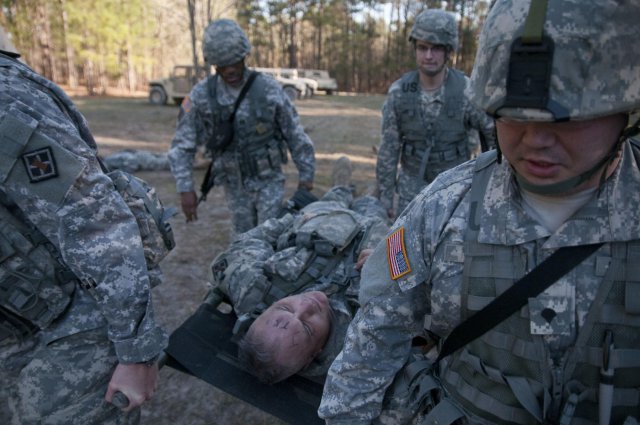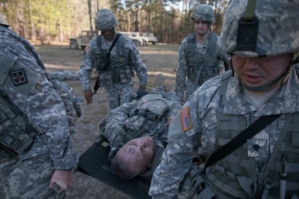A coroner has ruled that the casual attitude adopted by three army reservists who did not follow set army procedures were the root cause of their death during a training march.
Lance Corporals Edward Maher and Corporal James Dunsby were part time reservists who thought they thought of joining the SAS reserve on July 13th 2013. They showed up for the same at Pen Y Fan in the Brecon Beacons. That day happened to be the hottest day of the year with temperatures soaring to 27 degrees Celsius. In order to join the SAS reservists, each volunteer had to carry 22 kg in his backpack and march for 26 kilometers. Opportunities for filling their water bottle was limited.
Although regular soldiers were used to trekking 26 kilometers in mountainous terrain, the reservists however had no such preparation.
During the last leg of the 26km mountainous trek three men collapsed at different points. Roberts was pronounced dead on account of suffering heatstroke, Maher was rushed to Merthyr Tydfil’s Prince Charles Hospital and three hours later passed away while Dunsby died in hospital in Birmingham from multiple organ failure after a fortnight.
During the inquest, paramedic Damon James, stated that Dunsby’s body temperature was 41 degrees, the highest he had ever seen during his practice.
During the 2 week inquest a guidance from the MoD which had specifics on heat stroke was read out. The MoD’s guidance on heat stress was mentioned in a Joint Service Practice 539 – Climatic Illness and Injury in the Armed Forces (JSP 539) which specifically stated “where the risk of heat illness during a routine training event (eg fitness tests) is assessed as ‘likely’, then the training should be cancelled or changed to mitigate the risk.”
It was also mentioned in the inquest that other soldiers had withdrawn from the march since they were affected from the heat. This was before the three reservists collapsed and died. The officers in charge of the exercise admitted of not having read the code although it was mentioned in the risk assessment.
As per George Havenith, a professor of environmental physiology and ergonomics at Loughborough University, who was a witness at the inquest, the guidelines heat coupled with the humidity and wind speed measuring JSP 539, the 22kg load of the soldiers was effectively a 30kg load for the un-acclimatized soldiers. The professor mentioned this to BBC Radio 4’s ‘Today Programme’ after the inquest.
"The day before they could have seen they would come very close to the limit value. And on the day itself a reading was taken on this instrument at one of the camps; that reading was 31 degrees, five degrees above the limit value. It's very unfortunate that no action was taken when that reading was done," said Prof. Havenith.
Although the reservists were fitted with GPS so that they could be tracked, but during the inquest it was told that the system was not fit for that purpose. The three reservists were found two and half hours after they collapsed.
While pronouncing judgement, Coroner Hunt said that the risk assessment before the exercise was inadequate. Further, dynamic assessments was not carried out once the reservists fell ill.
Having heard the verdict, James Dunsby’s widow, Bryher Dunsby said “They displayed no responsibility, no accountability, and no humility for their role in creating the culture which lead to the events on the 13 July 2013. Even an ounce of this would have gone such a long way in acknowledging the vast catalogue of errors which were so clearly made.”
On its part the HSE is still continuing its investigation into the death of these reservists.
References:
http://www.healthandsafetyatwork.com/hsw/risk-assessment/dunsby-maher-roberts
Lance Corporals Edward Maher and Corporal James Dunsby were part time reservists who thought they thought of joining the SAS reserve on July 13th 2013. They showed up for the same at Pen Y Fan in the Brecon Beacons. That day happened to be the hottest day of the year with temperatures soaring to 27 degrees Celsius. In order to join the SAS reservists, each volunteer had to carry 22 kg in his backpack and march for 26 kilometers. Opportunities for filling their water bottle was limited.
Although regular soldiers were used to trekking 26 kilometers in mountainous terrain, the reservists however had no such preparation.
During the last leg of the 26km mountainous trek three men collapsed at different points. Roberts was pronounced dead on account of suffering heatstroke, Maher was rushed to Merthyr Tydfil’s Prince Charles Hospital and three hours later passed away while Dunsby died in hospital in Birmingham from multiple organ failure after a fortnight.
During the inquest, paramedic Damon James, stated that Dunsby’s body temperature was 41 degrees, the highest he had ever seen during his practice.
During the 2 week inquest a guidance from the MoD which had specifics on heat stroke was read out. The MoD’s guidance on heat stress was mentioned in a Joint Service Practice 539 – Climatic Illness and Injury in the Armed Forces (JSP 539) which specifically stated “where the risk of heat illness during a routine training event (eg fitness tests) is assessed as ‘likely’, then the training should be cancelled or changed to mitigate the risk.”
It was also mentioned in the inquest that other soldiers had withdrawn from the march since they were affected from the heat. This was before the three reservists collapsed and died. The officers in charge of the exercise admitted of not having read the code although it was mentioned in the risk assessment.
As per George Havenith, a professor of environmental physiology and ergonomics at Loughborough University, who was a witness at the inquest, the guidelines heat coupled with the humidity and wind speed measuring JSP 539, the 22kg load of the soldiers was effectively a 30kg load for the un-acclimatized soldiers. The professor mentioned this to BBC Radio 4’s ‘Today Programme’ after the inquest.
"The day before they could have seen they would come very close to the limit value. And on the day itself a reading was taken on this instrument at one of the camps; that reading was 31 degrees, five degrees above the limit value. It's very unfortunate that no action was taken when that reading was done," said Prof. Havenith.
Although the reservists were fitted with GPS so that they could be tracked, but during the inquest it was told that the system was not fit for that purpose. The three reservists were found two and half hours after they collapsed.
While pronouncing judgement, Coroner Hunt said that the risk assessment before the exercise was inadequate. Further, dynamic assessments was not carried out once the reservists fell ill.
Having heard the verdict, James Dunsby’s widow, Bryher Dunsby said “They displayed no responsibility, no accountability, and no humility for their role in creating the culture which lead to the events on the 13 July 2013. Even an ounce of this would have gone such a long way in acknowledging the vast catalogue of errors which were so clearly made.”
On its part the HSE is still continuing its investigation into the death of these reservists.
References:
http://www.healthandsafetyatwork.com/hsw/risk-assessment/dunsby-maher-roberts


 Three reservists die for want of preparedness of the army
Three reservists die for want of preparedness of the army





 Companies
Companies